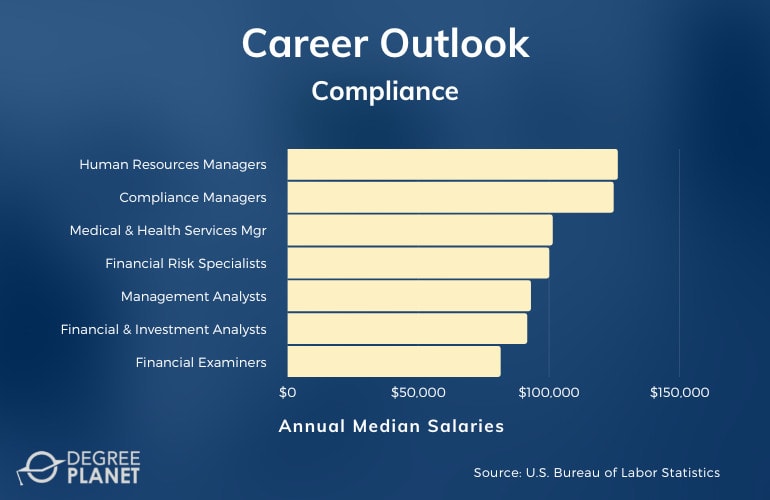If you’re considering working in the field of compliance, then it could be beneficial to earn a masters in compliance.

Those earning a law degree may also choose to pursue a specialty in compliance in law school. It’s not necessary to be an attorney, though, to work in this field. Compliance professionals are experts in the regulations and laws governing their industry. This can make them key members in both public and private organizations.
Editorial Listing ShortCode:
As compliance regulations change and increase with new technologies, these professionals continue to be needed to act as law and regulation guides for businesses.
Masters in Compliance Programs Online

A masters in compliance and risk management online program is designed to provide you with the foundational knowledge of regulatory and compliance law.
Compliance professionals help guide businesses and organizations through their specific industry regulations—ensuring that they comply with both internal rules and external laws.
During a compliance masters program, you can expect to be exposed to topics like:
- Risk management
- Legal systems and analysis
- Financial compliance
- Business regulations
- Statistical analysis
- Leadership
- Ethics
- Aspects of clinical research
- Legal policy and history
Typically, these degree programs offer concentrations that focus on various industries. For instance, students may choose to focus on corporate compliance, where they help corporations comply with laws and regulations.
Editorial Listing ShortCode:
Others may specialize in healthcare compliance, where they deal with regulatory frameworks in healthcare. Other common concentrations can include human resources compliance, financial services compliance, and regulatory compliance. Each industry is governed by its own set of regulations and rules.
To give an example, a business may put rules in place governing employee behavior to meet anti-discrimination laws. Or, a hospital may have a strict hiring process to ensure nurses and doctors meet certain education and experience requirements.
In each industry, compliance experts ensure that their organization and its workers follow these rules for the health of the organization and to comply with external laws. It’s also possible to specialize in compliance while earning a law degree, but you do not need to be an attorney to pursue a career in compliance law.
Common Online Compliance Masters Degree Concentrations

Since every industry has its own set of compliance rules, most compliance degree programs allow you to choose a concentration to specialize in your preferred industry. Common concentrations include:
- Corporate Compliance. Corporate compliance relates to an internal set of rules that govern corporate organizations. These help the organization meet certain objectives and comply with external laws.
- Healthcare Compliance. This concentration focuses on legal and regulatory frameworks that relate to the development, marketing, and sales of healthcare services and products.
- Human Resources Compliance. This concentration focuses on regulations governing employment and human rights and explores ways to manage conduct risks.
- Financial Services Compliance. This concentration focuses on keeping markets fair and reducing financial crime and systemic risk. It also focuses on the prevention of money laundering and identity theft.
- Regulatory Compliance. This concentration focuses on regulations and laws imposed by external forces, such as city, state, and federal governments. This could include advertising regulations, environmental regulations, privacy laws, and more.
Some degree programs also offer a general compliance track, where you can acquire a broad knowledge of regulatory and legal frameworks.
Compliance Careers and Salaries

Since most industries are required to meet certain internal and external regulations, compliance experts are needed in a variety of sectors. Typically, compliance professionals help an organization navigate regulations as well as investigate non-compliance issues and handle remedial measures.
According to the Bureau of Labor Statistics, here are the median annual wages for potential career paths related to compliance.
| Careers | Annual Median Salaries |
| Human Resources Managers | $126,230 |
| Compliance Managers (Included in Managers, All Other) | $124,650 |
| Medical and Health Services Managers | $101,340 |
| Financial Risk Specialists | $100,000 |
| Management Analysts | $93,000 |
| Financial and Investment Analysts | $91,580 |
| Financial Examiners | $81,410 |
| Labor Relations Specialists | $77,010 |
| Compliance Officers | $71,650 |
| Loan Officers | $63,380 |
Compliance professionals can work in a variety of industries, such as healthcare, finance, human resources, and more.
These professionals may advise on rules and regulations, run corporate compliance programs, and more. They will likely also be present during critical policy discussions to help avoid liability. Job titles can include compliance officer, executive policy director, legal educator, and risk management consultant.
Editorial Listing ShortCode:
Potential career titles and salaries may vary depending upon your concentration, experience, prior education, and extenuating qualifications.
Compliance Master’s Curriculum & Courses

The coursework in masters in compliance online programs can differ depending on the school and concentration, but many feature a similar curriculum. Courses you may take include:
- Introduction to Corporate Compliance: This course provides an introduction to the foundational features of a successful corporate compliance program.
- Statistical Analysis: This course overviews the concepts and fundamentals behind practicing biostatistics in relation to health data.
- Practical Quality Management: This course overviews Six Sigma, Lean principles, and the DMIAC technique for quality management process creation and improvement.
- Applied Quality and Regulatory Practices: This course explores laboratory standards, quality, and compliance regulations, and it also covers system components that support compliance efforts.
- Applied Research and Writing: This course overviews the writing of academic and technical papers, with a focus on logical argument development, use of documentation, clarity, and structure.
- Risk and Decision Management: This course explores the fundamentals of risk and decision management in the life science industries, with a focus on human factors analysis, fault-tree analysis, hazard analysis, and more.
- Leadership in the Regulatory Environment: This course overviews leadership topics, such as communication strategies, leading teams, and navigating regulatory environment challenges.
- Essentials of Initiating Clinical Research: This course acts as an analysis of the clinical research process, with a focus on applying guidelines that govern clinical research and clinical trial conduct.
- Healthcare Regulatory Environment: This course explores healthcare laws, statutes, regulations, and enforcement initiatives that act as a framework for compliance in healthcare.
- IT Systems Compliance: This course focuses on legal and regulatory computer system requirements as well as how to ensure system specifications meet regulatory requirements.
Schools can offer varying concentrations, so it’s helpful to find a program that provides courses that align with your preferred area of study. Some masters programs also require a capstone project or thesis.
Admissions Requirements

While admissions requirements for a compliance master’s degree can vary depending on your school, there are many similar requirements for graduate degree admissions.
Some of the most common admissions requirements include:
- Bachelor’s degree
- Academic transcripts
- Resume and personal statement
- Cumulative GPA of 3.0, on average
- Letters of recommendation
Many schools no longer require GRE or GMAT scores for graduate admissions, but it’s helpful to check with your admissions office to determine whether they are required for your specific program.
Accreditation

Determining whether a potential school is accredited is an important step to take before applying to a Master of Law in Compliance program. Accreditation is, in essence, quality assurance that your school meets certain established standards.
Attending an accredited school is a precondition for certain forms of financial aid, and employers are also more likely to trust a degree that comes from an accredited institution. Regional accreditation is considered the most prestigious and widely recognized accreditation, and only a handful of organizations can grant regional accreditation to schools.
Editorial Listing ShortCode:
You can verify the validity of your school’s accreditation on the Council for Higher Education Accreditation’s website.
Financial Aid and Scholarships

Many students require financial assistance to complete a masters in compliance and risk management degree online. Luckily, there are many types of aid options available to qualifying students, including federal and state aid, scholarships, grants, and more.
Many scholarships and grants exist for various needs, merits, and areas of study. Looking into grants alongside student loans may help minimize overall education costs. If you do need the help of loans, both federal and state loan options may be available. You can determine your eligibility for government aid by filling out the Free Application for Federal Student Aid (FAFSA).
Some employers also offer financial aid programs to help their workers further their education. If you’re currently working, you can speak to your employer for more information.
What Is a Master in Compliance Degree?

A masters in compliance degree is designed to equip students with the expertise required to help organizations meet industry regulations and comply with laws.
Students focus on the regulations and rules that govern healthcare, education, nonprofits, business, and any other industry that must comply with industry regulations. You may have the opportunity to choose a concentration in general compliance, regulatory compliance, corporate compliance, or compliance in financial services, healthcare, or human resources.
The core topics of this degree program include quality management, business compliance, risk management, and more.
Should I Get a Master’s Degree in Compliance?

Earning a masters in compliance can help you advance your skills and professional qualifications in this growing field. As local, state, national, and global regulations become increasingly complex, businesses, financial institutions, and other industries are relying on compliance experts more than ever.
If you’re interested in studying advanced legal principles but do not intend to become an attorney, then this could be a strategic degree path. It could also serve as an area of specialty if you are studying law. Ultimately, whether you should get a masters in compliance will likely depend on your personal interests and career goals.
What Can You Do with a Compliance Master Degree?

Graduates with a masters in compliance may choose to work in industries like finance, healthcare, business, government, marketing, higher education, and more.
In each industry, compliance professionals ensure their employer complies with all internal and external regulations and laws. They may create and run compliance programs as well as handle non-compliance issues. Compliance professionals might work in-house at their organization or provide compliance consulting. They can help manage risks and give compliance advice.
Career titles may include compliance officer, compliance manager, executive policy director, compliance consultant, risk management consultant, quality director, and more.
How Long Does It Take to Get an Online Masters in Compliance Degree?

Most masters programs take 1 to 2 years to finish with full-time enrollment. Generally, if you are enrolled full-time and year-round, a standard 36 credit hour program may be completed in 1 year. Year-round enrollment includes taking classes during the summer term.
If your program includes a thesis requirement, this may add extra time to completion, as will attending part-time at any point in your studies. If you’re curious about different timeframes and accelerated tracks for online studies, you can talk to admissions officers at prospective schools to uncover your options.
Is a Master’s in Compliance Worth It?

Yes, a master’s in compliance is worth it for many students. Compliance experts continue to be in demand as local, national, and global regulations and laws become increasingly complex.
Editorial Listing ShortCode:
Plus, nearly every industry has its own set of regulations and laws. You may choose a degree concentration based on the sector you would like to work in. According to the Bureau of Labor Statistics, compliance officers are expected to see 4% job growth over the next ten years, which is as fast as the average for all occupations.
Universities Offering Online Masters in Compliance Degree Programs
Methodology: The following school list is in alphabetical order. To be included, a college or university must be regionally accredited and offer degree programs online or in a hybrid format.

Arizona State University offers a Master of Legal Studies program online with an emphasis in Corporate and Healthcare Compliance. Potential courses include U.S. Law and Legal Analysis, Fundamentals of Contract Law, and Healthcare Industry Compliance. Courses are typically 7.5 weeks long, and usually have several start dates per year. The program requires the completion of 10 courses for a total of 30 credit hours.
ASU is accredited by the Higher Learning Commission.

Cambridge College offers a Master’s Degree in Business Ethics and Compliance program online. Courses may include Strategic Leadership and Management, Legal and Ethical Dimensions of Strategic Management, and Governance, Ethics, and Compliance.
The program requires the completion of 30 credit hours, including 9 hours in the Compliance concentration, and a capstone project must typically be completed. Classes are usually taught in 5 week blocks.
Cambridge College is accredited by the New England Commission of Higher Education.

Florida State University offers an online program for a Juris Master with a concentration in Financial Regulation and Compliance. The program aims to teach topics such as contracts, torts, legislation and regulation, legal research, and regulatory compliance. The program requires the completion of 30 credit hours, and courses are typically 8 or 13 weeks long. Classes may be taken part time.
Florida State University is accredited by the Commission on Colleges of the Southern Association of Colleges and Schools.

Fordham University offers a Master of Studies in Law with a concentration in Corporate Compliance program online. Most classes have virtual synchronous meetings in the mornings and evenings. Optional tracks include Financial Services, Health Care, Human Resources, and General Compliance. U.S. News & World Report ranked Fordham University among the top 40 law schools in the country.
Fordham University is accredited by the Higher Learning Commission.

Liberty University offers a Juris Master in Compliance program online. The program is designed to teach topics such as legal systems, legal analysis, research of law topics, and history of law. Courses are typically 8 weeks long, and there are several start dates throughout the year. The completion of 30 credits is required and the program may be finished in just 1 year.
Liberty University is accredited by the Southern Association of Colleges and Schools Commission on Colleges.

Loyola University–Chicago offers a Master of Laws or Master of Jurisprudence in Compliance and Enterprise Risk Management. The LLM is designed for students who already have a JD. Both programs are offered fully online. Courses are typically offered in a 7 week accelerated format or may follow a regular semester schedule. There are usually start dates in the fall, spring, and summer.
Loyola University – Chicago is accredited by the Higher Learning Commission.

Northwestern University offers an online program for an MS in Regulatory Compliance. Concentrations include Clinical Research and Quality Systems. The program requires the completion of 11 classes, including a thesis or capstone project course. Many courses are taught in a synchronous format, and generally follow a regular semester schedule.
Northwestern University is accredited by the Higher Learning Commission.

Seattle University offers an online program for a Master of Legal Studies in Compliance and Risk Management. Potential courses include Foundations of Regulatory Compliance, Risk Management and Auditing, and Contract Review and Policy Drafting. The program typically has start dates in the fall and spring, and there are usually 3 terms each year. Courses are commonly 14 weeks long.
Seattle University is accredited by the Northwest Commission on Colleges and Universities.

The University of Pittsburgh offers an MSL in Corporate Compliance program online. A law degree is not required for admission. Potential courses include Introduction to Corporate Compliance, Ethics and Compliance Programs, and Designing, Measuring Effectiveness.
The program requires the completion of 30 credit hours, and courses commonly follow a regular semester schedule. There are typically 2 start dates each year.
The University of Pittsburgh is accredited by the Middle States Commission on Higher Education.

Washington University in St. Louis offers a Master of Laws or a Master of Legal Studies in Regulatory Compliance program online. Potential courses include Contracts, Corporate Compliance, Health Law, and Employment Law.
Courses aim to teach the interpretation of legal regulations, analysis of contractual agreements, implementation of workplace policies and the prevention of legal actions against the organization. There are typically 3 start dates per year.
Washington University in St. Louis is accredited by the Higher Learning Commission.
Getting Your Master’s in Compliance Online

Much like with a masters in dispute resolution online, earning your masters in compliance online offers a convenient opportunity to complete an advanced degree around your schedule.
If you’re interested in compliance law and want to help organizations navigate complex regulations, then this may be a fitting path for you. As a compliance expert, you could help organizations navigate the regulations and laws governing their industry.
From healthcare compliance to corporate compliance and beyond, this degree may offer you the flexibility to become intricately involved in an industry you’re passionate about.
You could start exploring accredited universities today to find the compliance program and concentration that best match your schedule and goals.

